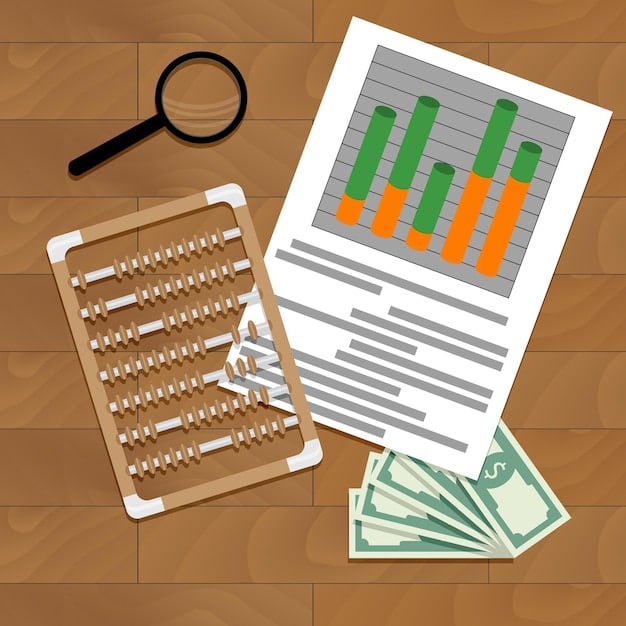Unclaimed Government Money: Claim What’s Yours in 5 Minutes!

Unclaimed government money represents funds and benefits owed to individuals by various government agencies, often remaining unclaimed due to unawareness or outdated contact information; discover how to quickly check if you’re entitled to thousands of dollars in unclaimed benefits.
Are you leaving money on the table? The government might owe you funds you’re not even aware of. Unclaimed government money: Are You Missing Out on Benefits Worth Thousands? Find Out in 5 Minutes – is a reality for many U.S. citizens, and this article will guide you on how to check and claim what’s rightfully yours.
What is Unclaimed Government Money?
Unclaimed government money refers to funds held by federal and state agencies that belong to individuals, businesses, or organizations that haven’t claimed them yet. This can happen for various reasons, such as forgotten accounts, uncashed checks, or outdated contact information.
These funds can come from a variety of sources, making it essential to understand where to look and how to claim them. Knowing the common sources of unclaimed funds can significantly increase your chances of finding money that belongs to you.

Common Sources of Unclaimed Funds
Unclaimed government funds originate from diverse sources. Here’s a breakdown:
- Tax Refunds: Uncashed tax refund checks issued by the IRS are a common source.
- Pension Funds: Unclaimed retirement benefits from deceased relatives or former employers.
- Savings Bonds: Matured savings bonds that haven’t been redeemed.
- Mortgage Insurance Refunds: Refunds owed after a mortgage is paid off.
These are instances where bureaucracy and forgotten paperwork can lead to you missing out on your rightful funds. Understanding the origins of this money is the first step toward recovering it.
In summary, unclaimed government money can arise from varied sources such as tax refunds, retirement accounts, savings bonds, and mortgage insurance refunds. Knowing where this money comes from helps you start your search efficiently.
Why Does Government Hold Unclaimed Money?
The government holds unclaimed money for several reasons, mostly stemming from administrative processes and outdated information. When funds cannot be delivered to the intended recipient, they are held in trust until claimed.
Agencies are required to safeguard these funds and make efforts to locate the rightful owners. This system aims to prevent fraud and ensure that the money eventually reaches those it belongs to.
Government’s Role in Protecting Unclaimed Funds
Government agencies follow stringent protocols to manage unclaimed funds. Here are some key aspects:
- Safeguarding: Agencies securely hold the funds in trust.
- Efforts to Locate Owners: They attempt to notify owners through available contact information.
- Record Keeping: Detailed records of the funds and potential owners are maintained.
- Compliance: Agencies comply with federal and state laws regarding unclaimed property.
The government’s role is to act as a responsible custodian, taking essential steps to find and connect individuals with their unclaimed assets. This might involve mailing notifications or publishing databases but it’s not always a foolproof system, hence the importance of individual initiative.
In essence, the government holds unclaimed money due to undeliverable payments, acting as a custodian to protect the funds until claimed. They follow strict protocols and maintain detailed records to ensure the rightful owners can eventually recover their assets.

States Where You Are Most Likely to Find Unclaimed Money
Several states have large amounts of unclaimed property, making them hotspots for potential discoveries. These states often have robust economies and large populations, leading to more opportunities for unclaimed funds to accumulate.
Checking the websites of these states might be particularly rewarding. Many of these states have user-friendly search tools and resources to assist residents in finding their missing money or assets.
Top States for Unclaimed Property
Certain states stand out due to the large volume of unclaimed property they hold. Consider checking these states first:
- California: With a large population and economy, California holds billions in unclaimed property.
- New York: New York’s financial sector and dense population contribute to significant unclaimed funds.
- Texas: Texas has a growing economy and population, resulting in substantial unclaimed assets.
- Florida: Florida’s large retiree population often leaves behind unclaimed funds.
While other states also have unclaimed property programs, these tend to have the most significant holdings.
In summary, states like California, New York, Texas, and Florida are prime locations for finding unclaimed money due to their large economies and populations. Checking their unclaimed property databases should be a priority.
How to Search for Unclaimed Government Money
Searching for unclaimed government money involves checking various databases and websites. The process typically starts with federal agencies and then extends to state-level resources.
Gathering your personal information and systematically checking each source will maximize your chances of finding unclaimed funds. You can go to the website annualcreditreport.com, which is the only website that is congressionally authorized to provide your credit report for free.
Steps to Check for Unclaimed Funds
Follow these steps to conduct a thorough search:
- Gather Personal Information: Collect your Social Security number, addresses, and any previous names used.
- Check Federal Databases: Start with websites like USA.gov and TreasuryDirect.gov.
- Search State Unclaimed Property Sites: Visit the official unclaimed property websites for states where you’ve lived.
- Review Pension and Retirement Funds: Check with the Pension Benefit Guaranty Corporation (PBGC).
- Contact the IRS: Inquire about any uncashed tax refund checks.
Systematically following these steps ensures that you cover all potential sources of unclaimed government money. It’s also important to be patient, as results may not be immediate.
In conclusion, searching for unclaimed government money requires a methodical approach. Gather your personal details, check federal and state databases, review pension and retirement funds, and contact the IRS to maximize your chances of finding unclaimed funds.
Avoiding Scams Related to Unclaimed Money
Scammers often target individuals searching for unclaimed money, so it’s crucial to be vigilant. These scams can take various forms, from fake websites to unsolicited phone calls requesting personal information or fees.
Being aware of common scam tactics and knowing how to identify them can save you from falling victim. Remember, legitimate unclaimed property programs never require up-front fees. The website annualcreditreport.com is the only website congressionally authorized to provide your credit report for free, so remain aware of similar scams.
Red Flags of Unclaimed Money Scams
Watch out for these warning signs:
- Requests for Up-Front Fees: Legitimate programs never ask for money to release unclaimed funds.
- Unsolicited Contact: Be wary of calls or emails from unknown sources claiming to have your unclaimed money.
- Pressure Tactics: Scammers often pressure you to act quickly.
- Requests for Personal Information: Never provide sensitive information like bank account numbers or Social Security numbers.
It’s also advisable to verify any claims by contacting the relevant government agency directly. Scammers rely on the hope that people won’t take the time to independently verify their claims.
In summary, be vigilant when searching for unclaimed money to avoid scams. Watch out for requests for up-front fees, unsolicited contact, pressure tactics, and demands for personal information. Always verify claims independently with the relevant government agency.
Success Stories: Real People Claiming Unclaimed Money
Hearing real success stories can motivate and provide insights into the process of claiming unclaimed money. Many individuals have successfully recovered significant sums they were unaware they were owed.
These stories highlight the importance of persistence and thorough research in the search for unclaimed funds. Whether it’s a small refund or a substantial inheritance, reclaiming what’s yours can be life-changing.
Inspirational Examples of Successful Claims
Here are a few notable examples:
- Tax Refund Recovery: A woman discovered an uncashed tax refund check from several years ago and successfully claimed the funds, using the money to pay off debt.
- Inherited Savings Bonds: A man found matured savings bonds belonging to his deceased father and was able to redeem them, receiving a significant windfall.
- Mortgage Insurance Refund: A family received a substantial mortgage insurance refund after paying off their home, which they used for home renovations.
These accounts illustrate the potential benefits of checking for unclaimed government money. They also demonstrate that unclaimed funds can be found by people from all walks of life.
In conclusion, success stories of individuals reclaiming unclaimed money serve as inspiration and highlight the potential rewards of persistence. These real-life examples demonstrate that anyone can find and claim what’s rightfully theirs with diligent effort.
| Key Point | Brief Description |
|---|---|
| 💰 Unclaimed Funds | Money held due to uncashed checks, forgotten accounts, etc. |
| 🔍 How to Search | Check federal & state databases, IRS, pension funds. |
| 🚨 Avoid Scams | Never pay fees or share personal info with unverified sources. |
| 🏢 Top States | CA, NY, TX, FL have high unclaimed property amounts. |
Frequently Asked Questions
▼
Unclaimed government money refers to funds held by federal and state agencies that haven’t been claimed by their rightful owners due to various reasons like uncashed checks or outdated addresses.
▼
You can search for unclaimed money by checking federal and state databases online. Start with USA.gov and the websites of states where you’ve lived to maximize your search.
▼
Common sources include uncashed tax refunds, pension funds, savings bonds, and mortgage insurance refunds. Checking these areas first can often lead to quicker results in your search.
▼
Beware of requests for upfront fees or personal information over the phone or email. Legitimate unclaimed property programs never require you to pay to claim your funds.
▼
If you find unclaimed money, follow the instructions provided by the agency holding the funds. Usually, this involves providing proof of identity and residence to claim your assets.
Conclusion
Discovering and claiming unclaimed government money requires patience and persistence, but is well worth the effort. By following the steps outlined in this article and staying vigilant against scams, you can ensure that you’re not missing out on funds that are rightfully yours. Start your search today and reclaim what belongs to you!





